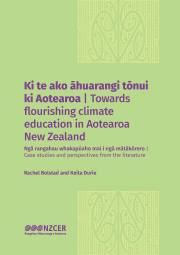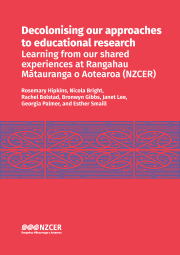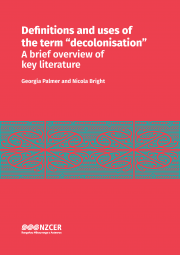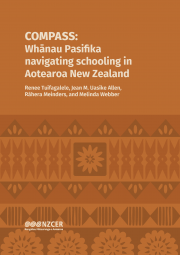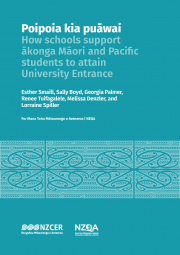Climate change presents escalating risks to young people and communities, including risks to the achievement of educational outcomes.
You are here
Research publications
Research publications from our research teams.
The latest publications are shown by default. Refine your search using the filters below. Press CTRL + click to select more than one option in a group.
Decolonising our approaches to educational research— Learning from our shared experiences at Rangahau Mātauranga o Aotearoa (NZCER) shares insights from a recent workshop at NZCER focused on the questions, tensions and challenges our kairangahau are grappling with in research and evaluation.
It includes a description of the workshop structure and processes, and summaries of workshop presentations given by kairangahau. Our work in decolonising our approaches to educational research is constantly evolving as we learn from our own and others’ experiences.
“In the end, decolonization simply means having faith that we can still be brave enough to change an imposed reality”—Moana Jackson (2018, p. 2)
This paper explores the origins of the term “decolonisation” and its various definitions within the literature. It also gives some examples of contemporary usage. In this paper we privilege the work of Māori and Indigenous writers who have paved the way for the ongoing work of decolonising education in Aotearoa New Zealand.
This research report, produced for National Library of New Zealand Te Puna Mātauranga o Aotearoa (National Library), focused on a Pūtoi Rito Communities of Readers project carried out in Dargaville in 2023-24.
Pūtoi Rito is a National Library initiative that works with communities to design, develop, and deliver support for reading engagement among children and young people. The Dargaville project focused on young people during their primary and intermediate school years, as well as whānau as part of school communities and other community settings.
Ready for Partnership? will help you to create written or visual texts which welcome ākonga Māori. We hope that this tool will give you ways of reflecting on texts as you create them, before you then go on to do further work with kaupapa Māori colleagues.
Ready for Partnership? has two sections. Section 1 provides seven lenses which focus on the ways in which we’re using various Māori cultural perspectives when creating texts, and Section 2 presents some annotated examples which show how the tool may be used.
Poipoia ngā tamariki: Ko How whānau and teachers support tamariki Māori to be successful in learning and education te pūrongo COMPASS tuatoru i hua ake i te pāhekohekotanga i waenga i a Rangahau Mātauranga o Aotearoa me Ahorangi Melinda Webber mō te tātaritanga raraunga i kohia mā roto i tana kaupapa rangahau ā-motu Kia tū rangatira ai: Living, thriving and succeeding in education.
This report focuses on the perspectives of whānau Pasifika as they express their attitudes and beliefs about what success looks like for their tamariki and why success is important. It employs the Indigenous practice of wayfinding to frame discussions of success through a range of values whānau Pasifika hold, and supportive characteristics they enact that steer their tamariki towards achieving their educational aspirations.
In 2022, the New Zealand Qualifications Authority (NZQA) identified a range of schools at which the University Entrance (UE) attainment of ākonga Māori and Pacific students was at least 10% higher than their decile (now EQI) band average.
In 2023, NZQA asked Rangahau Mātauranga o Aotearoa NZCER to work with six of these higher UE attainment schools to explore how they support ākonga Māori and Pacific students to attain UE.
"Those concerned about the future of te reo Māori must work to ensure that the values listed in the Māori Language Act become a reality for all who call Aotearoa New Zealand home. We must ensure that they are not simply the aspirations of a few, but are threads firmly woven into the social fabric of the country."
This publication is a presentation given by Dr Richard Benton, the founder of Te Wāhanga and lead of the landmark Survey of Language Use in Māori Households and Communities 1973-1978.
In 2023, the New Zealand Council for Educational Research (NZCER), on contract to the Ministry of Education, undertook research to assess schools’ responses to the Equity Index (EQI) and the associated key questions:





